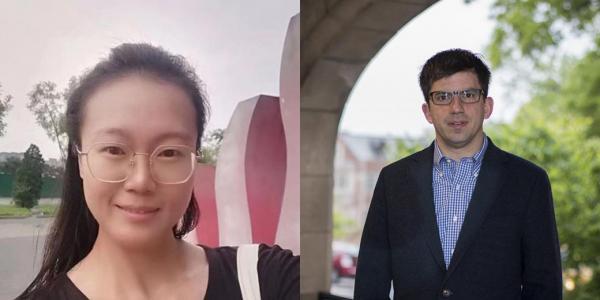Department of Music Lecture: Fang Liu, Doctoral student in musicology, Washington University in St. Louis and Benjamin Duane, Associate Professor of Music, Washington University in St. Louis
Fang Liu, Doctoral student in musicology, Washington University in St. Louis
Title
“Negotiating Racial Identity: Racialized Assimilation in the Performances of Lee Tung Foo as the First Chinese American Vaudeville Singer”
Abstract
Lee Tung Foo (1875–1966), the pioneering Chinese-American professional vaudeville baritone, emerged as a prominent figure in American popular music during the early 20th century. This paper focuses on Lee’s career as a case study to examine the portrayal of Chinese and Chinese Americans in early American popular songs and the intricate negotiation of racial identity within the context of music and performance. Existing research has illuminated the link between early American popular songs with Chinese themes and racial discourse; however, a gap in scholarship remains regarding the racialization of Chinese-American voices within this cultural spectrum. This paper aims to bridge this gap through the lens of “racialized assimilation,” a theoretical framework that combines concepts of assimilation and racialization, to analyze Lee's performances, audience reactions, correspondence with his vocal coach, and newspaper reviews. By examining these primary sources, the paper sheds light on Lee’s negotiation of racial identity through performance. I argue that while Lee achieved success in vaudeville, breaking barriers for other Chinese and Asian immigrants in American popular culture, his performances unintentionally reinforced negative stereotypes of Chinese immigrants through the process of racialized assimilation. The findings suggest that Lee's assimilation into American culture through his performances, while notable, followed a distinctive trajectory compared to his Irish and Jewish American counterparts, as it was complicated by racialized perceptions. Therefore, the adoption of a racialized assimilation framework may best capture Lee's experience as a Chinese-American singer.
Biography
Fang Liu is pursuing a doctorate degree in musicology at Washington University in St. Louis. Her research interests focus on the intersection of critical racial theory and music. She is particularly interested in how music participates in racial equity and social justice.
Benjamin Duane, Associate Professor of Music, Washington University in St. Louis
Title
“‘So Lonesome I Could Cry’: The Tear-Jerking Refrain in Country Music”
Abstract
Few things typify country music better than songs about heartbreak. From Jimmie Rodgers to Patsy Cline, George Jones to Tim McGraw, country singers of all stripes have poured out their lonely broken hearts. But while the ubiquity of country heartbreak songs is well known, their structure and stylistic conventions have gone mostly unexplored. This talk will work to fill this gap by tracing the history of a structural formula common in country heartbreak songs. This formula, called the tear-jerking refrain, had its heyday during the honky-tonk years of the 1940s and 50s, during which most country songs lacked choruses but verses often ended with a one-line refrain. In the heartbreak songs, a formula was common in which the verse’s first lines describe the narrator’s sorrow while the refrain pointedly crystalizes it—in a tear-jerking fashion. Prof. Duane examines instances of this formula from earlier, verse-only songs by Hank Williams, Lefty Frizzell, and others. But he also explores how the formula was adapted for songs in verse-chorus by later artists such as Merle Haggard, George Strait, and Garth Brooks.
Biography
Ben Duane serves as Associate Professor of Music at Washington University in St. Louis, where he teaches courses on tonal music theory, analysis, music cognition, and computational modelling. Before coming to Washington University, he earned his doctorate in Music Theory and Cognition from Northwestern University and held a Mellon Post-Doctoral Fellowship in music at Columbia University. As a researcher, he specializes in form, texture, computational modelling, Western art music of the late eighteenth and early nineteenth centuries, and American country music. His work has appeared in Music Theory Spectrum, the Journal of Music Theory, Music Analysis, and Music Perception.

